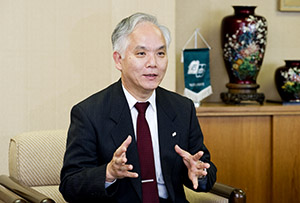25 February 2010
Nagoya University Research is one of a number of measures that Nagoya University is taking to raise its international profile and establish itself as a hub for research and education in Asia under the leadership of the university's president, Michinari Hamaguchi.
 Neatly symbolizing the free and liberal intellectual atmosphere at Nagoya University is the first thing that a visitor notices upon arriving at the university: the campus has no gates. It is this spirit of independence and the fostering of creativity in research that has led to the awarding of four Nobel Prizes to Nagoya University alumni, and to the creation of a number of widely used inventions such as the blue light-emitting diode. The same culture of intellectual freedom encourages Nagoya University researchers to collaborate across scientific and engineering disciplines.
Neatly symbolizing the free and liberal intellectual atmosphere at Nagoya University is the first thing that a visitor notices upon arriving at the university: the campus has no gates. It is this spirit of independence and the fostering of creativity in research that has led to the awarding of four Nobel Prizes to Nagoya University alumni, and to the creation of a number of widely used inventions such as the blue light-emitting diode. The same culture of intellectual freedom encourages Nagoya University researchers to collaborate across scientific and engineering disciplines.
Yet as the university marks its 70th anniversary and Nagoya celebrates 400 years since the construction of Nagoya Castle, a symbol of the region's long history of industrial and political prowess, recent events and shifts in global society have presented a new set of challenges. The world is becoming increasingly borderless, and universities must maintain a focus on adapting to the changing education and research environment. Michinari Hamaguchi, who assumed the presidency of Nagoya University in April 2009, is enthusiastic as he talks about the steps that his university is taking to meet these challenges of a changing world -- challenges that reach far beyond the confines of the campus.
"Recent global disorders such as the financial crisis and prolonged wars in Afghanistan and the Middle East were triggered by a lack of understanding and respect between people from different backgrounds," says Hamaguchi. "It is really important for a university to create an environment that spurs the interaction, or even collision, of different cultures based on high-level academic activities. Through such experiences, students will acquire internationally competitive capabilities."
Nagoya University is no stranger to the issue of international diversity; it has been engaged in developing initiatives aimed at accommodating overseas students for many years. Under the Young Leaders Program, for example, the Graduate School of Medicine invites public administrators in medical sector from other Asian countries and provides all sessions in English. The School of Law sends legal experts to Vietnam and other countries to help construct legal systems and assist in collaborative research projects. Moreover, every summer, the School of Engineering in collaboration with engineers from automotive companies hold a popular summer intensive program for visiting students from the US and Europe. Nagoya University is well-placed to act as an international hub for this kind of collaboration with industry -- the Nagoya region is home to the Toyota Motor Company and the aerospace arm of Mitsubishi Heavy Industries among many other high-profile industrial leaders. All this makes the university's summer programs of particular interest to international students, attracting more than 1,500 students from about 70 countries.
Hamaguchi plans to strengthen these endeavors and in 2011 intends to introduce a new system that aims to have both Japanese and visiting students conduct everything from paperwork to lectures and examinations in English -- the first such attempt at a Japanese national university. Under the Japanese government's 'Global 30' program, Nagoya University aims to double the number of international students to 3,000 by 2021. At the same time, Japanese students are to be given greater opportunity to study in English on campus and abroad.
The university's new president also has high expectations for Nagoya University Research as an online resource for promoting the very best published work carried out at Nagoya University. "I hope that the website will encourage international students from diverse backgrounds to visit our university," Hamaguchi says. "Studying here would not only be a precious experience for the students, but would also be a great stimulus for teaching amongst our faculties."
As global barriers are broken down and the role of universities in society changes, so new challenges arise. Nagoya University is responding to these challenges by devising new strategies that will allow it not only to weather the storm, but to flourish.